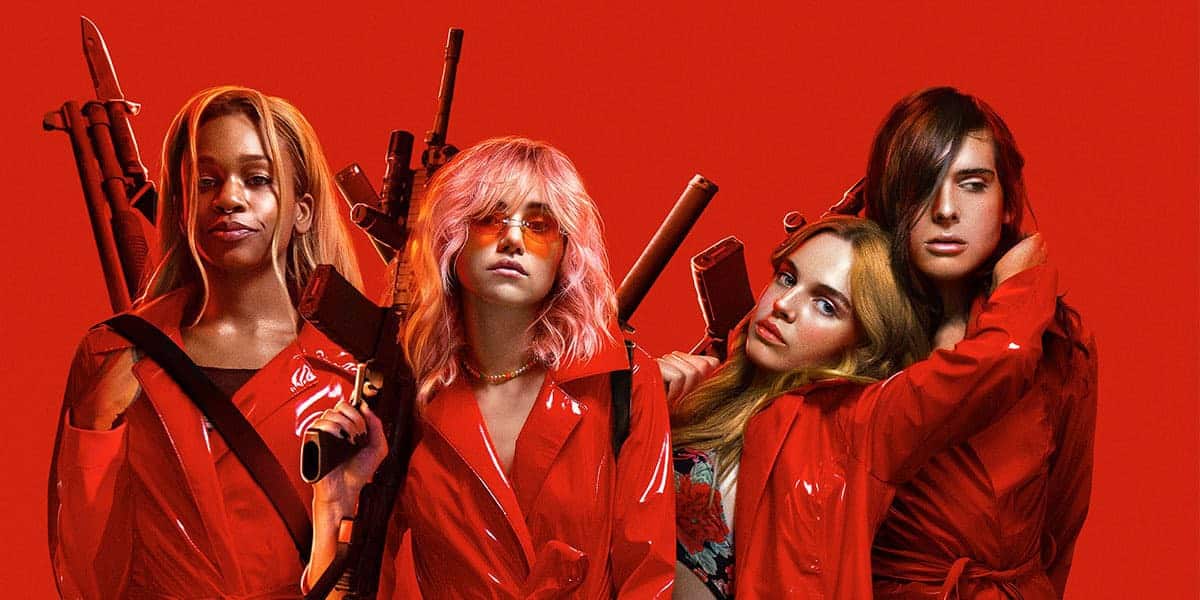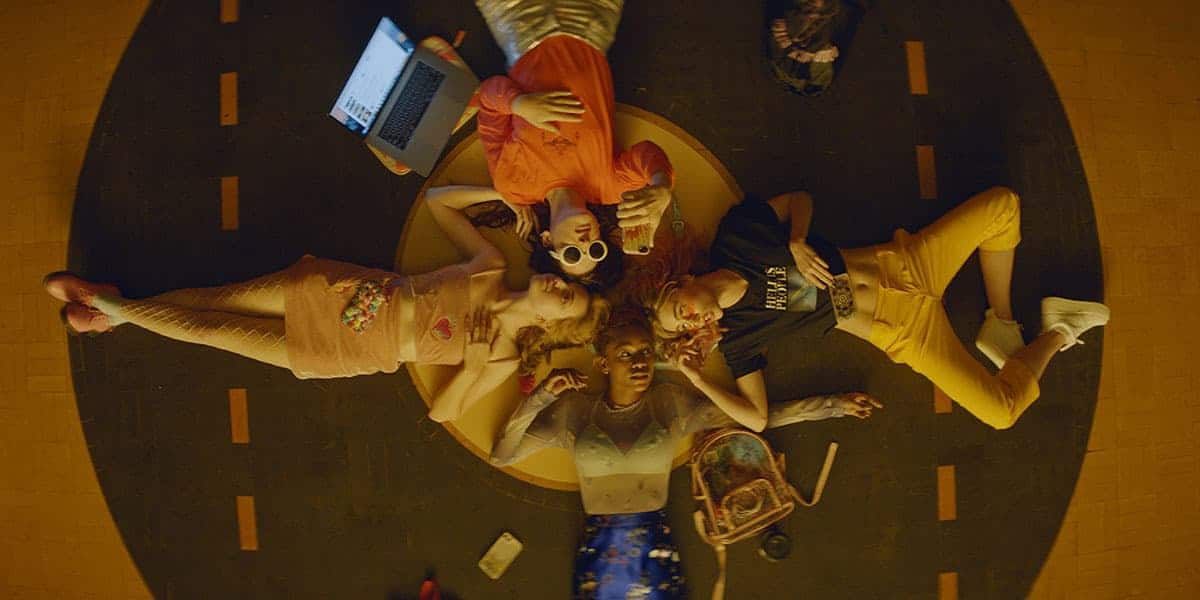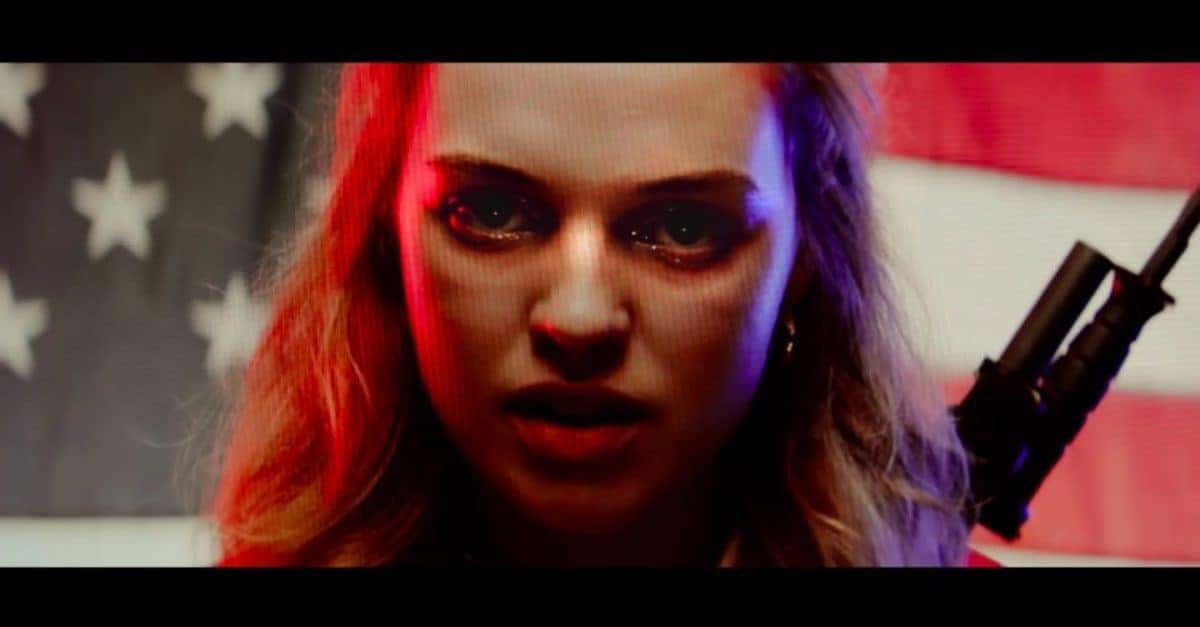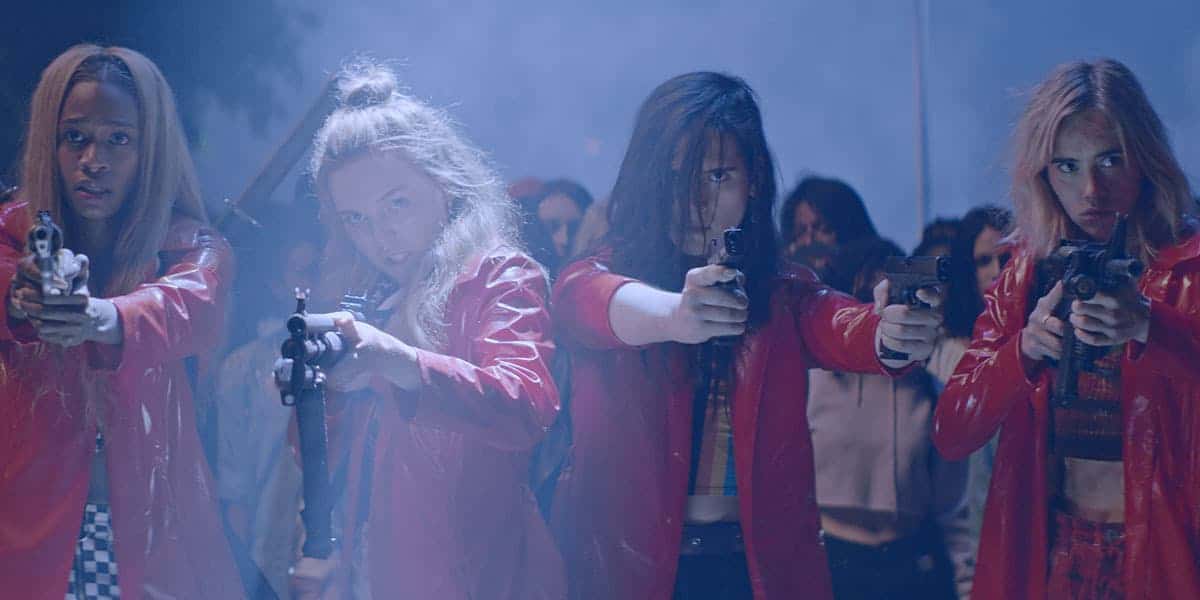Director Sam Levinson, together with stars Hari Nef, Suki Waterhouse, and Abra, discuss Assassination Nation, a film about the broken way people communicate in America today.

Assassination Nation, written and directed by Sam Levinson, echoes some of the realities and debates surrounding the Trump administration. Most of all, the film addresses the mainstream visibility of right-wing views that his election seems to have made possible, and the misogynist implications of that system.
Thankfully, however, the film acknowledges the fact that the hatred and anger now at the forefront of American politics are logical consequences of attitudes that were already there. Trump didn’t invent American racism and sexism, he simply exacerbated and, for its most ardent followers, legitimised them.
The film follows a group of four young high school seniors, all of them sexually liberated and progressive in their politics, but also extremely knowledgeable about the world, in that very specific way young, internet-savvy women now often are. Each goes through her own moments of uncertainty and heartbreak, experimentation and disappointment; the film keenly underlines both their independence, and the support and strength they get from each other.
When someone leaks their private nudes to the rest of the school, the girls quickly realise that their own unapologetic, sex positive attitude has been infuriating the rest of the world to a much higher degree than they had realised. A veritable witch-hunt unfolds in the town of Salem, with the whole population rising up to attack and kill the girls.
However, Levinson does not aim to crush our spirits, and even in its grim first half, Assassination Nation is a highly entertaining, visually inventive, commercial film. It becomes even more satisfying when the film shifts into a more fantastical register: the girls fight back. Even in those moments of glorious bloodshed, the film never trivialises death and maintains an intelligent perspective on the need for violence and firearms. This complex mix of feminist politics and low-brow genre fun was hard to swallow for some, but it is one of the most exciting and thrilling female-centric films of the year for us.
Director Sam Levinson, together with stars Hari Nef, Suki Waterhouse, and Abra, talked to Elena Lazic at TIFF’18 about creating realistic young women of today, making a film about communication, keeping the attention of the impatient modern viewer, and more.
Seventh Row (7R): The film is really realistic in reflecting almost every aspect of being a young woman in America today. How, as a director and writer, did you make these characters feel so real?
Sam Levinson (SL): The wonderful thing about the internet is that it’s a way to express how you feel about the world, no matter who you are — if you seek out people’s perspectives, their experiences, if you listen to what they say, if you empathize with them, if you look at the world from their perspective. 14-year-olds are writing think pieces on how they feel about the world. It’s not hard to figure out what people are feeling. That’s part of it — sort of ingesting it, not judging it, and then sitting down and writing from that perspective.
[click_to_tweet tweet=” ‘The wonderful thing about the internet is that it’s a way to express how you feel about the world, no matter who you are. If you seek out people’s perspectives, it’s not hard to figure out what they are feeling.’ -Sam Levinson” quote=” ‘The wonderful thing about the internet is that it’s a way to express how you feel about the world, no matter who you are. If you seek out people’s perspectives, it’s not hard to figure out what they are feeling.’ —Sam Levinson”]
But I can only get so far. What was really wonderful about this cast, and what I looked at all of them for, individually and collectively, is to go, “here’s my experience, here’s my thoughts on this.” As a writer, I then start to rewrite it a little bit, and I start to weave in who they are as individuals. You end up with something that’s more emotionally honest. It’s more accurate. You end up with a better performance in the long run because there’s a closeness to the material.
7R: So you guys really contributed to your own characters. Was it a dialogue to build them?
Abra (A): Yeah, he definitely asked us what we thought about a lot of the script, and asked us to inject our own experiences where we could, where we felt it was safe and healthy to, to make it the most accurate portrayal of what was going on.
Hari Nef (HN): There was a lot of improvisation; there was a lot of freewheeling. I think that so much of the film is rooted in these fantastical elements of action, satire, dystopian X Y and Z, but those scenes where we’re just lying around in the bedroom, talking smack, ground all of the larger-than-life things that happen in the film in this realistic relationship between these four girls. It’s very much rooted in character and heart and all of these very warm and fuzzy things. I think that the brashness and the no-punches-pulled approach that these girls take to just talking about the world is a part of that — perhaps the most important part of that.

A: That’s what drew me to the script: just the intimacy, and the conversations between the girls. I mean, he nailed it. You were saying you couldn’t have done that by yourself, but you got it pretty far! I was like, “who wrote this?!”, you know?
7R: Where did the line, “I’m not a bitch, I’m a feminist?” come from?
SL: Improvised!
The film is this crazy piece, but I think at the end of the day I wanted to reflect the madness of the internet. I started writing it five days before my wife gave birth to her first child, and I was really nervous about where our country was headed, just the amount of vitriol and rage that seemed to be sort of bubbling up. I wanted to kind of emotionally unpack it, and deal with it in the only what that I know how to, as a writer and a filmmaker.
[click_to_tweet tweet=”‘Those scenes where we’re just lying around in the bedroom, talking smack, ground all of the larger-than-life things that happen in the film.’ -Hari Nef” quote=”‘Those scenes where we’re just lying around in the bedroom, talking smack, ground all of the larger-than-life things that happen in the film.’ —Hari Nef”]
Also, I wanted to write a film that I felt mirrored the kind of emotional intensity and volatility of the internet. You open up your phone on any morning, and you’re reading: here’s a story of someone getting shot; here’s a street fight; here’s a cat video; here’s a someone singing a song to a dying family member. And that’s all in the span of like five minutes! It’s this emotional roller coaster. It’s so intense, and it adds up to this dizzying feeling about how do you navigate this world and keep your sanity. In some way, this movie serves as a roadmap for how to navigate the world, and the fantasy of how you sometimes wish you could navigate the world, which is by saying “You know what? Fuck you, I don’t give a shit. I’m not going to take it anymore.”
Suki Waterhouse (SW): It’s like being on the other side of being so scared about your privacy, and people knowing everything about you. On the other side, it’s like, you know my worst parts; you know the things I’m capable of. And two fingers up to you, I don’t care; I’m just going to survive this.

7R: The violence in the film is so shocking, because you realize people could actually do this. What was your approach and attitude toward violence in the film?
SL: I wanted to elaborate and bring to life to the anxieties and fears that these four characters have about the world. I wanted to make the audience feel complicit in it. I wanted the audience to sit there and judge the way they talk about, you know, guys and life and school, and think, “They’re narcissistic and self-obsessed,” the way that people judge almost all young people, specifically young women. And then, I wanted them to see that judgment reflected in a very real, very brutal way, and then kind of flip that on its head and say, “And this is how they wish they could respond. This is their own fanfiction. This is how they wish they could write their ending and response to it.”
I wanted the violence to be real, and I think there’s always a fine line in putting violence on screen. At what point do you glorify it? At what point does it feel like it’s not real enough or not true enough? That’s a tightrope that every filmmaker walks, and you have to trust the instincts of the people around you. You have to trust the instincts of your cast and figure out exactly where that balance is. A lot of thought went into it, and while it is violent, I think it feels true in some weird, horrific, scary way.
[click_to_tweet tweet=” ‘In some way, this movie is a roadmap for how to navigate the world, and the fantasy of how you sometimes wish you could navigate the world – which is by saying ‘Fuck you, I don’t give a shit.” -Sam Levinson” quote=” ‘In some way, this movie is a roadmap for how to navigate the world, and the fantasy of how you sometimes wish you could navigate the world — which is by saying ‘Fuck you, I don’t give a shit.” —Sam Levinson”]
HN: The context of all of this hate and all of this judgment cues up the violence. You see the source of the violence, and you see the multiple forces — discursively, psychologically, culturally — that lead up to that moment. Obviously, the violence is shocking to see, but the fact that it’s going on is as American as cherry pie. It’s what happens in this country to people, to women, who are deemed guilty of something egregious. The fact that we get to see it is shocking, but the fact that it goes on should be very familiar.
SL: The psychological violence that precedes the actual violence is in some ways the most disturbing, and in a lot of ways, is sort of the least talked about.

7R: If there’s one thing you would want audiences to take away from [the film], what would it be?
A: I wish the people watching would think about how we all watch each other, and be less judgmental about it. Step away from the lens, question your lens for a second. Even if it’s the right one, just step away for a second, you know?
[click_to_tweet tweet=”‘This is how these girls wish they could respond, their own fanfiction. This is how they wish they could write their ending.’ -Sam Levinson” quote=”‘This is how these girls wish they could respond, their own fanfiction. This is how they wish they could write their ending.’ —Sam Levinson”]
HN: I would like people to question their own certainty of the truth, of what is right, of what is good, of what is kind. I think that our nation is stratified along two sides right now that are 100% sure of their own rightness, righteousness. If this film could incite people to parochialize that point of view a little bit and dig deeper and perhaps question it, that could be a catalyst for positive conversations.
SL: Conversations that I think can ultimately move things forward. Right now, in America at least, we’re in this sort of stand-off. And standoffs don’t normally end well, you know? It’s nerve-wracking for all of us in many ways.
HN: I found myself questioning my own points of view even just during the filming of the movie when we were going to the Louisiana gun range. I was just like [in an uncertain tone] “Oh, guys…” I still have perhaps liberal-leaning views about gun control. But I was in a part of the country that I had never lived in for an extended period, and my prejudices about the conservative South, or the Bible Belt, were totally changed and shifted just by the time that I spent down there. If you open your eyes and your heart, you’ll be surprised.
[click_to_tweet tweet=”‘Obviously, the violence is shocking to see, but the fact that it’s going on is as American as cherry pie.’ -Hari Nef” quote=”‘Obviously, the violence is shocking to see, but the fact that it’s going on is as American as cherry pie.’ —Hari Nef”]
SL: If I hear a gunshot, I just want to drop to the ground and hide, so it’s weird being in a gun range because you’re hearing shooting, and you’re not supposed to react to it. It’s the scariest thing!
HN: Working with those guns, holding the guns and firing them — I understand why these things are important to people, especially people who feel extra vulnerable.
SL: 100 percent! I get it! The emotional motivation and the psychological motivation for wanting to protect yourself, I understand that, irrespective of my politics. I think what the movie’s ultimately about is their ideology in and of itself is bound to fail. This film is about discourse. It’s about the way in which we communicate: if you operate with an absolute certainty that you are right, and your actions are therefore just, that’s a recipe for a horror film, and that’s what this movie is about.
HN: Period.
[click_to_tweet tweet=”‘Right now, in America at least, we’re in this sort of stand-off. And standoffs don’t normally end well, you know?’ -Sam Levinson” quote=”‘Right now, in America at least, we’re in this sort of stand-off. And standoffs don’t normally end well, you know?’ —Sam Levinson”]
7R: The film addresses complex topics deeply and precisely. But it’s a very entertaining movie, with a commercial aesthetic. The trailer is very fun and all the posters and imagery are really fun —
HN: That’s the other thing about this movie, it’s fun! We’re talking about all these heavy things — this is like a large popcorn, large slushie, go-with-all-your-friends movie.
SL: That we made on a low budget! We made it for very little money!
HN: And not to sound cocky, but I think that’s the way of the future. It’s weaving challenging themes into approachable genre films that are accessible to everybody.
[click_to_tweet tweet=”‘If you operate with an absolute certainty that you are right, and your actions are therefore just, that’s a recipe for a horror film, and that’s what this movie is about.’ -Sam Levinson” quote=”‘If you operate with an absolute certainty that you are right, and your actions are therefore just, that’s a recipe for a horror film, and that’s what this movie is about.’ —Sam Levinson”]
SL: The internet has changed the way I think we watch films. Every single one of us, no matter how much we love movies, are all guilty of looking at a shot, seeing a shot on camera, and checking Instagram in the seven seconds it takes someone to walk across the screen. And then 20 minutes later we’re going “Shit, what happened here?” And we’ve gotta, you know, go back. Every single one of us is guilty of it!
The challenge for me, as a filmmaker, is: How do I tell a story — that’s meaningful, that’s about something I care about, that’s about issues that I think are relevant today — within the constraints of this new world? This world in which every audience member has a screen closer to their face than our screen? How do you tell a story that just tracks that kind of roller coaster ride?
And at the same time, every audience member sits in the movie theatre going, “I know what’s going to happen.” This film consistently asks, “Are you sure about that?” And it rips the rug out from underneath you in the same way the internet does. In the same way that we think we know a story, we know the truth about something — guess what.
[click_to_tweet tweet=”‘We’re talking about all these heavy things – but this is a large popcorn, large slushie, go-with-all-your-friends movie.’ -Hari Nef” quote=”‘We’re talking about all these heavy things — but this is a large popcorn, large slushie, go-with-all-your-friends movie.’ —Hari Nef”]
HN: We think we know who the next president’s going to be.
SL: And boom, the rug gets ripped out from under you.
HN: The rug gets ripped, girl! That rug do be getting ripped.
SL: We wanted to make a film where, if you look away for more than 30 seconds, you’re out, you know?
[click_to_tweet tweet=”‘We wanted to make a film where if you look away for more than 30 seconds, you’re out.’ – Sam Levinson” quote=”‘We wanted to make a film where if you look away for more than 30 seconds, you’re out.’ – Sam Levinson”]

